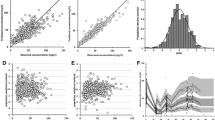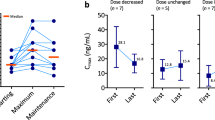Summary
Purpose Despite the established activity of regorafenib in metastatic colorectal cancer (CRC), gastrointestinal stromal tumor (GIST), and hepatocellular carcinoma (HCC), its toxicity profile has limited clinical use. We aimed to evaluate the pharmacokinetics of regorafenib and its active metabolites M-2/M-5, and to clarify the relationships between total drug-related exposure and clinical outcomes in real-world practice. Methods Blood samples at steady state were obtained during Cycle 1 from patients treated with regorafenib. Plasma concentrations of regorafenib and its metabolites were measured by liquid chromatography–tandem mass spectrometry. The efficacy and safety endpoints were progression-free survival (PFS) and dose-limiting toxicities (DLTs), respectively. The exposure–response relationships were assessed. Results Thirty-four Japanese patients with advanced cancers were enrolled (CRC, n = 26; GIST and HCC, each n = 4). Nine patients started regorafenib treatment at the recommended dose of 160 mg once daily (3 weeks on / 1 week off), while the other patients received a reduced starting dose to minimize toxicities. The median PFS was significantly longer in patients achieving total trough concentrations (Ctrough) of regorafenib and M-2/M-5 ≥2.9 µg/mL than those who did not (112 vs. 57 days; p = 0.044). Furthermore, the cumulative incidence of DLTs during the first 2 cycles was significantly higher in patients with summed Ctrough levels ≥4.3 µg/mL than in others (p = 0.0003). Conclusions Dose titration of regorafenib to achieve drug-related Ctrough levels between 2.9 and 4.3 µg/mL in Cycle 1 may improve efficacy and safety, warranting further investigation in a larger patient population.
Clinical trial registry: Not applicable.





Similar content being viewed by others
Data availability
The data supporting the findings of this study are available on request from the corresponding author. The data are not publicly available because of privacy or ethical restrictions.
References
Wilhelm SM, Dumas J, Adnane L, Lynch M, Carter CA, Schütz G, Thierauch KH, Zopf D (2011) Regorafenib (BAY 73-4506): a new oral multikinase inhibitor of angiogenic, stromal and oncogenic receptor tyrosine kinases with potent preclinical antitumor activity. Int J Cancer 129:245–255
Grothey A, Van Cutsem E, Sobrero A, Siena S, Falcone A, Ychou M, Humblet Y, Bouché O, Mineur L, Barone C, Adenis A, Tabernero J, Yoshino T, Lenz HJ, Goldberg RM, Sargent DJ, Cihon F, Cupit L, Wagner A, Laurent D, CORRECT Study Group (2013) Regorafenib monotherapy for previously treated metastatic colorectal cancer (CORRECT): an international, multicentre, randomised, placebo-controlled, phase 3 trial. Lancet 381:303–312
Li J, Qin S, Xu R, Yau TC, Ma B, Pan H, Xu J, Bai Y, Chi Y, Wang L, Yeh KH, Bi F, Cheng Y, Le AT, Lin JK, Liu T, Ma D, Kappeler C, Kalmus J, Kim TW, CONCUR Investigators (2015) Regorafenib plus best supportive care versus placebo plus best supportive care in Asian patients with previously treated metastatic colorectal cancer (CONCUR): a randomised, double-blind, placebo-controlled, phase 3 trial. Lancet Oncol 16:619–629
Demetri GD, Reichardt P, Kang YK, Blay JY, Rutkowski P, Gelderblom H, Hohenberger P, Leahy M, von Mehren M, Joensuu H, Badalamenti G, Blackstein M, Le Cesne A, Schöffski P, Maki RG, Bauer S, Nguyen BB, Xu J, Nishida T, Chung J, Kappeler C, Kuss I, Laurent D, Casali PG, GRID study investigators (2013) Efficacy and safety of regorafenib for advanced gastrointestinal stromal tumours after failure of imatinib and sunitinib (GRID): an international, multicentre, randomised, placebo-controlled, phase 3 trial. Lancet 381:295–302
Bruix J, Qin S, Merle P, Granito A, Huang YH, Bodoky G, Pracht M, Yokosuka O, Rosmorduc O, Breder V, Gerolami R, Masi G, Ross PJ, Song T, Bronowicki JP, Ollivier-Hourmand I, Kudo M, Cheng AL, Llovet JM, Finn RS, LeBerre MA, Baumhauer A, Meinhardt G, Han G, RESORCE Investigators (2017) Regorafenib for patients with hepatocellular carcinoma who progressed on sorafenib treatment (RESORCE): a randomised, double-blind, placebo-controlled, phase 3 trial. Lancet 389:56–66
Grothey A, Blay JY, Pavlakis N, Yoshino T, Bruix J (2020) Evolving role of regorafenib for the treatment of advanced cancers. Cancer Treat Rev 86:101993
Yoshino T, Komatsu Y, Yamada Y, Yamazaki K, Tsuji A, Ura T, Grothey A, Van Cutsem E, Wagner A, Cihon F, Hamada Y, Ohtsu A (2015) Randomized phase III trial of regorafenib in metastatic colorectal cancer: analysis of the CORRECT Japanese and non-Japanese subpopulations. Invest New Drugs 33:740–750
Solms A, Reinecke I, Fiala-Buskies S, Keunecke A, Drenth HJ, Bruix J, Meinhardt G, Cleton A, Ploeger B (2017) Exposure-response relationship of regorafenib efficacy in patients with hepatocellular carcinoma. Eur J Pharm Sci 109S:S149–S153
Gerisch M, Hafner FT, Lang D, Radtke M, Diefenbach K, Cleton A, Lettieri J (2018) Mass balance, metabolic disposition, and pharmacokinetics of a single oral dose of regorafenib in healthy human subjects. Cancer Chemother Pharmacol 81:195–206
Kort A, Durmus S, Sparidans RW, Wagenaar E, Beijnen JH, Schinkel AH (2015) Brain and testis accumulation of regorafenib is restricted by breast cancer resistance protein (BCRP/ABCG2) and P-glycoprotein (P-GP/ABCB1). Pharm Res 32:2205–2216
Fujita KI, Masuo Y, Yamazaki E, Shibutani T, Kubota Y, Nakamichi N, Sasaki Y, Kato Y (2017) Involvement of the transporters P-glycoprotein and breast cancer resistance protein in dermal distribution of the multikinase inhibitor regorafenib and its active metabolites. J Pharm Sci 106:2632–2641
Maeda A, Irie K, Ando H, Hasegawa A, Taniguchi H, Kadowaki S, Muro K, Tajika M, Aoki M, Inaguma K, Kajita M, Fujimura A, Fukushima S (2019) Associations among regorafenib concentrations, severe adverse reactions, and ABCG2 and OATP1B1 polymorphisms. Cancer Chemother Pharmacol 83:107–113
Taguchi D, Inoue M, Fukuda K, Yoshida T, Shimazu K, Fujita K, Okuyama H, Matsuhashi N, Tsuji A, Yoshida K, Miura M, Shibata H (2020) Therapeutic drug monitoring of regorafenib and its metabolite M5 can predict treatment efficacy and the occurrence of skin toxicities. Int J Clin Oncol 25:531–540
Kubota Y, Fujita KI, Takahashi T, Sunakawa Y, Ishida H, Hamada K, Ichikawa W, Tsunoda T, Shimada K, Masuo Y, Kato Y, Sasaki Y (2020) Higher systemic exposure to unbound active metabolites of regorafenib is associated with short progression-free survival in colorectal cancer patients. Clin Pharmacol Ther 108:586–595
Sunakawa Y, Furuse J, Okusaka T, Ikeda M, Nagashima F, Ueno H, Mitsunaga S, Hashizume K, Ito Y, Sasaki Y (2014) Regorafenib in Japanese patients with solid tumors: phase I study of safety, efficacy, and pharmacokinetics. Invest New Drugs 32:104–112
Jain L, Woo S, Gardner ER, Dahut WL, Kohn EC, Kummar S, Mould DR, Giaccone G, Yarchoan R, Venitz J, Figg WD (2011) Population pharmacokinetic analysis of sorafenib in patients with solid tumours. Br J Clin Pharmacol 72:294–305
Boudou-Rouquette P, Narjoz C, Golmard JL, Thomas-Schoemann A, Mir O, Taieb F, Durand JP, Coriat R, Dauphin A, Vidal M, Tod M, Loriot MA, Goldwasser F, Blanchet B (2012) Early sorafenib-induced toxicity is associated with drug exposure and UGTIA9 genetic polymorphism in patients with solid tumors: a preliminary study. PLoS One 7:e42875
Fine JP, Gray RJ (1999) A proportional hazards model for the subdistribution of a competing risk. J Am Stat Assoc 94:496–509
Ducreux M, Petersen LN, Öhler L, Bergamo F, Metges JP, de Groot JW, Wang JY, García Paredes B, Dochy E, Fiala-Buskies S, Cervantes A, O’Connor JM, Falcone A, CORRELATE Investigators (2019) Safety and effectiveness of regorafenib in patients with metastatic colorectal cancer in routine clinical practice in the prospective, observational CORRELATE study. Eur J Cancer 123:146–154
Keunecke A, Hoefman S, Drenth HJ, Zisowsky J, Cleton A, Ploeger BA (2020) Population pharmacokinetics of regorafenib in solid tumours: exposure in clinical practice considering enterohepatic circulation and food intake. Br J Clin Pharmacol 86:2362–2376
Fukudo M, Tamaki G, Azumi M, Kakizaki H, Matsumoto S, Tasaki Y (2021) Absorption of the orally active multikinase inhibitor axitinib as a therapeutic index to guide dose titration in metastatic renal cell carcinoma. Invest New Drugs 39:595–604
Margaillan G, Rouleau M, Fallon JK, Caron P, Villeneuve L, Turcotte V, Smith PC, Joy MS, Guillemette C (2015) Quantitative profiling of human renal UDP-glucuronosyltransferases and glucuronidation activity: a comparison of normal and tumoral kidney tissues. Drug Metab Dispos 43:611–619
Bekaii-Saab TS, Ou FS, Ahn DH, Boland PM, Ciombor KK, Heying EN, Dockter TJ, Jacobs NL, Pasche BC, Cleary JM, Meyers JP, Desnoyers RJ, McCune JS, Pedersen K, Barzi A, Chiorean EG, Sloan J, Lacouture ME, Lenz HJ, Grothey A (2019) Regorafenib dose-optimisation in patients with refractory metastatic colorectal cancer (ReDOS): a randomised, multicentre, open-label, phase 2 study. Lancet Oncol 20:1070–1082
Argiles G, Margalef NM, Valladares-Ayerbes M, de Prado JV, Grávalos C, Alfonso PG, Santos C, Tobeña M, Sastre J, Benavides M, Cano T, Loupakis F, Garrote MR, Rivera F, Goldberg R, Falcone A, Bennouna J, Ciardiello F, Tabernero J, Aranda E (2019) Results of REARRANGE trial: a randomized phase 2 study comparing different dosing approaches for regorafenib (REG) during the first cycle of treatment in patients (pts) with metastatic colorectal cancer (mCRC). Ann Oncol 30:Abstract O-026
Fukuoka S, Hara H, Takahashi N, Kojima T, Kawazoe A, Asayama M, Yoshii T, Kotani D, Tamura H, Mikamoto Y, Hirano N, Wakabayashi M, Nomura S, Sato A, Kuwata T, Togashi Y, Nishikawa H, Shitara K (2020) Regorafenib plus nivolumab in patients with advanced gastric or colorectal cancer: an open-label, dose-escalation, and dose-expansion phase Ib trial (REGONIVO, EPOC1603). J Clin Oncol 38:2053–2061
Acknowledgements
We thank all patients and medical staff who contributed to this study.
Funding
This work was supported in part by a grant from the Japan Society for the Promotion of Science (JSPS) KAKENHI (No. 16K08902) and a grant from the Foundation for Promotion of Cancer Research.
Author information
Authors and Affiliations
Contributions
Study concept and design: M.F.; acquisition, analysis, or interpretation of data: all authors; drafting of the manuscript: M.F.; critical revision of the manuscript for important intellectual content: all authors; statistical analysis: M.F.; acquisition of funding: M.F.; administrative, technical, or material support: K.A., C.T., M.M., K.A., and N.U; supervision: M.F.
Corresponding author
Ethics declarations
Disclosure of potential conflicts of interest
No authors have any conflicts of interest to declare.
Informed consent
Written informed consent was obtained from each patient prior to enrollment.
Ethics approval and consent to participate
The protocol of this study was approved by the institutional ethics committee of Asahikawa Medical University (#15018). The study was performed in accordance with the Declaration of Helsinki and its amendments.All patients provided written informed consent to participate in the study.
Consent for publication
All authors approved the final version of the manuscript.
Additional information
Publisher’s note
Springer Nature remains neutral with regard to jurisdictional claims in published maps and institutional affiliations.
Supplementary Information
ESM 1
(PDF 231 KB)
Rights and permissions
About this article
Cite this article
Fukudo, M., Asai, K., Tani, C. et al. Pharmacokinetics of the oral multikinase inhibitor regorafenib and its association with real‐world treatment outcomes. Invest New Drugs 39, 1422–1431 (2021). https://doi.org/10.1007/s10637-021-01115-4
Received:
Accepted:
Published:
Issue Date:
DOI: https://doi.org/10.1007/s10637-021-01115-4




